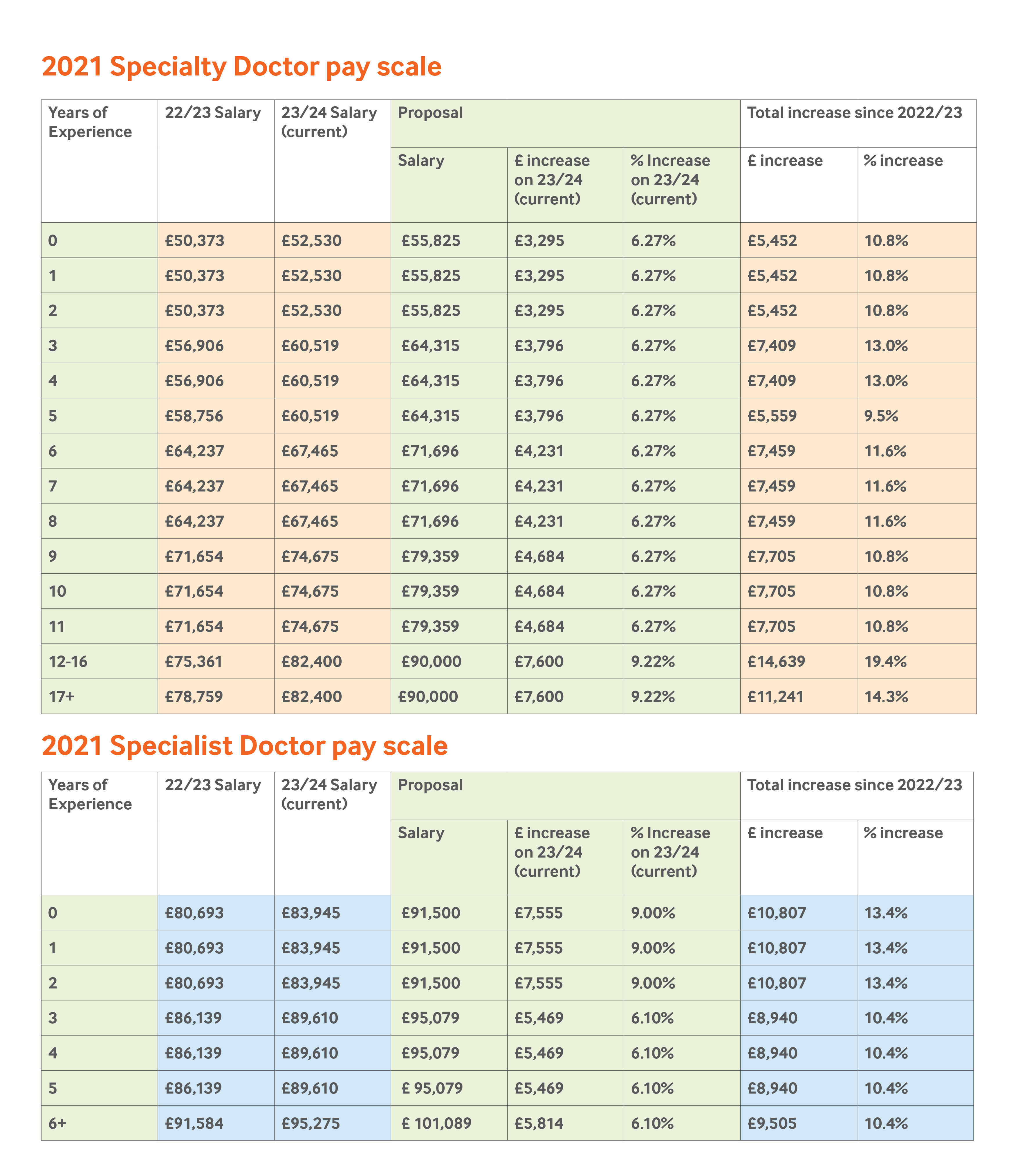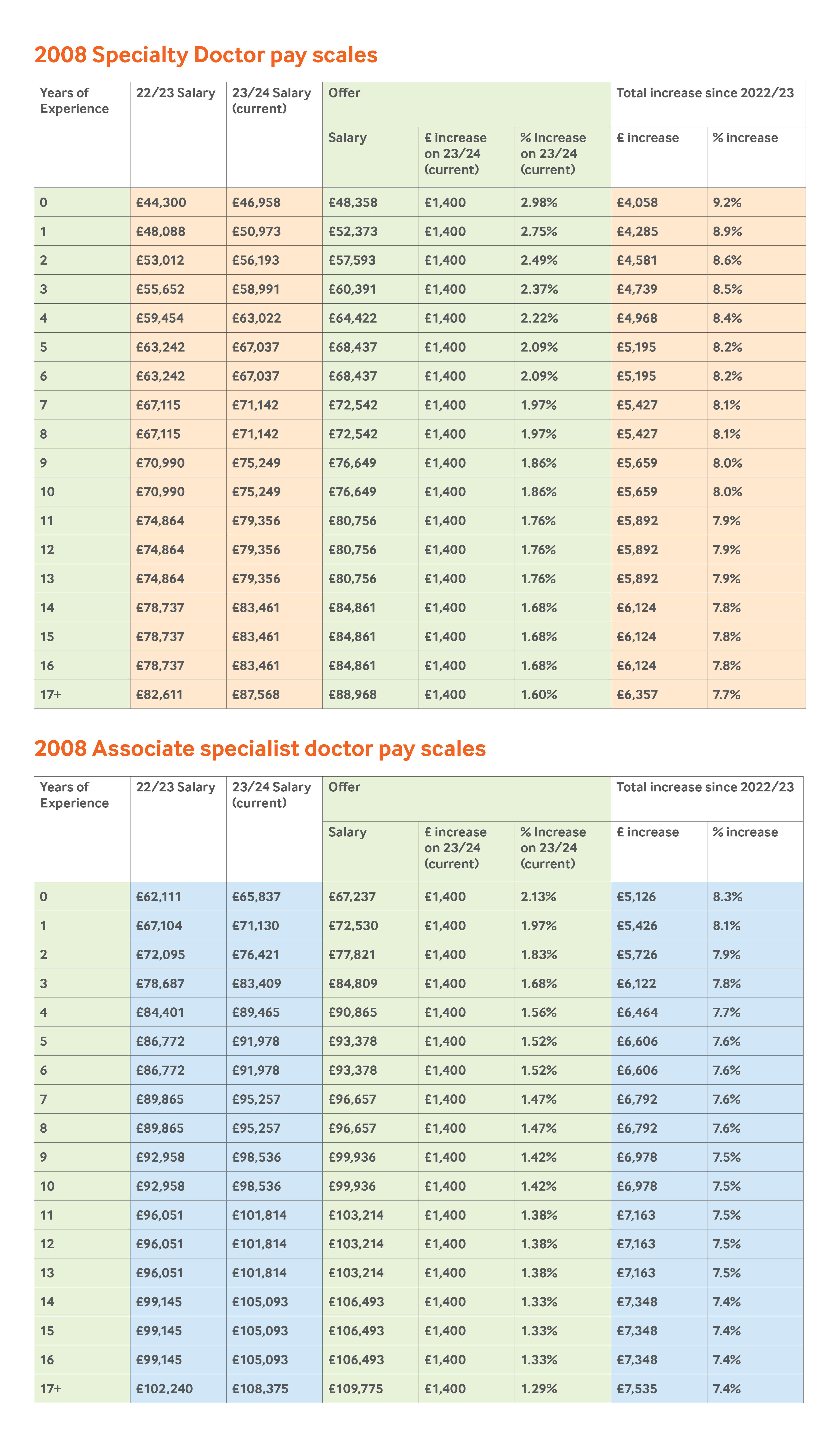In January 2024, an offer from the Government was put to SAS doctors in England via a referendum. This offer was the result of several weeks of negotiation, and we put it to members because the committee believed it had to democratically consult members at that stage, having rejected numerous offers previously. However, we stopped short of endorsing it and presented all the information neutrally.
Members voted for the BMA to reject this offer on their behalf, and the BMA carried out a survey of members to get more information on where the offer fell short and what improvements they wanted to see. The key criticism of the first offer was that it didn’t go far enough on pay; in particular a major concern was that it would not have improved pay for SAS doctors on closed contracts. Representatives from the association and the Department of Health and Social Care (DHSC) returned to talks with the aim of producing an improved offer that responded to members’ feedback and could end the pay dispute.
After weeks of intensive discussions, we managed to secure a major concession from Government. Previously, they’d stated that they would not consider any pay uplift for SAS doctors on closed, pre-2021 contracts: this was a red line in their negotiating position. The BMA’s SAS negotiating team pushed hard on this and was able to use the rejection of the first offer and survey responses to explain that an offer that did not include a pay increase for closed contracts was not likely to be accepted by our membership.
We won this concession from Government. We believe this was the best offer we were able to get negotiating with the current Government at the time, and accordingly we endorsed the offer.
The offer was put to SAS doctor members in an online referendum which opened on 31 May and closed on 14 June, and we encouraged members to vote YES.
The offer is detailed below. Note that while it preserves several elements from the previous proposal, other aspects have changed, so please take the time to read it in full. If you have any questions get in touch with us.
The accepted offer
The accepted offer from Government to SAS doctors includes the following:
- Realigned 2021 pay scales, lifting basic pay for everyone on the 2021 (open) contracts.
- A consolidated £1400 pay uplift to each pay point on the closed contracts (on top of the 6% awarded by the DDRB for 2023/24)
- Work to better understand and improve the working situation of LEDs.
- Measures to facilitate career progression.
The key differences between this offer and the recently rejected one are:
- The introduction of a pay uplift for those on pre-2021 (closed) contracts
- The removal of the specialist catalyst pot
Funding for the specialist catalyst pot has been recycled into improving the pay offer. While this specific funding is no longer part of the offer, the BMA is still committed to improving career progression opportunities for the SAS cohort, and the offer still includes other measures to facilitate progression.
However, it is important to stress that SAS doctors will still receive a 2024/25 pay uplift through the DDRB, on top of this offer. If that DDRB recommendation is not good enough, we retain the right to seek to open new negotiations with the Government and, if necessary, we can open another dispute and re-ballot members for industrial action in the future.
Pay
Open contracts
DHSC offered investment to increase basic pay for both the 2021 specialty doctor and specialist pay scales. Everyone on these scales will receive an increase to their basic pay between 6.1% and 9.22% above current levels, which would mean a total pay increase of 9.5% to 19.4% since 2022/23 for these doctors (including the uplifts already received for 2023/24).
The following table details the 2021 pay scales, the revised pay scale proposed from the offer, and the difference between the two.
(Please note: While these revised pay scales have been implemented, pay for SAS doctors in England has since been further uplifted as the result of DDRB pay recommendations – please see the current pay scales.)

Please note:
- This pay scale realignment would be permanent, not a one-off increase for this year only.
- This means that the DDRB’s recommendation for a 2024/25 award would be on top of the increase in this offer.
- Pay will be offered on a pro rata basis (based on an average 10 session week).
Closed contracts
Responding to the clear feedback that members expected an uplift for doctors on the closed contracts (e.g. those which pre-date the 2021 terms and conditions), Government also offered a consolidated £1400 pay uplift to everyone on these pay scales. This means a total pay increase of 7.4% to 9.2% to the 2008 SAS pay scales since 2022/23. View the table which details the previous 2008 pay scales, and the revised pay scale proposed from the offer which has now been implemented as of October 2024.

The £1400 consolidated pay uplift will also be applied to pre-2008 contracts (including pre-2008 associate specialists, staff grade, etc).
Please note:
- This uplift to each point on the pay scales would be embedded in basic pay, so represents a recurring, pensionable increase – not a one-off payment for this year only.
- This means that the DDRB’s recommendation for a 2024/25 award would be on top of the increase in this offer.
- Pay will be offered on a pro rata basis (based on an average 10 session week).
Work on LEDs
As part of the agreed deal, DHSC, NHS England, NHS Employers and the BMA will carry out a joint piece of work focusing on LEDs. The shared objectives of this work are to:
- Better understand the make-up of the LED workforce (including their contractual terms and needs)
- Enable LEDs to move to permanent SAS contracts where this is in everyone’s best interests
While the final scope of the work is to be agreed, it is expected to include:
- The development of a process by which all LEDs who have been fulfilling a role that is comparable to the roles, duties and responsibilities of a SAS doctor for 24 months or more should be offered the option to move to a SAS contract.
- The process would also cover how LEDs who do not fulfil the criteria to move to national SAS contracts but are on fixed term contracts for 24 months or more can be provided with the option to be made permanent. Once the specifics of the proposal have been agreed, this would require a further decision prior to implementation.
- An agreement to promote the statutory right of LEDs with four or more years of continuous service on successive fixed-term contracts to be made permanent.
This work would begin by September 2024 and conclude in Spring 2025. The implementation stage is then expected to conclude in six months.
On introduction, any new process should become embedded as part of standard operations for employers. As the process embeds, the impact on the number of locally employed versus national contracts can be monitored through JNC SAS.
Career progression measures
As noted above, this offer removes the proposed £5m specialist catalyst post included in the previous offer. Feedback from the survey and webinars raised member concerns that the pot wouldn’t be used as intended and/or that it didn’t do enough to address career progression concerns. Rejection of the previous offer demonstrated that the catalyst pot wasn’t enough for members to approve a deal – there needed to be further improvement on the pay offer
It became evident that a systemic solution on career progression required further talks that would go beyond the timeframe of these negotiations if we were to reach a deal that would lift basic pay ahead of the 2024/25 pay review uplift. Considering this, as well as the clear message that a pay uplift for all SAS doctors was members’ priority, we agreed with Government to recycle this money to address the real concerns members had about pay, getting significant more for the value of the investment.
The Department of Health and Social Care, NHS Employers, NHS England and the BMA will take forward the following priority actions to support the career development and progression of SAS doctors:
- Developing advice and guidance specifically to support career progression for SAS doctors.
- Ensuring that for specialty doctors undertaking a specialist doctor role, the acting up clause (which already exists in the SAS terms and conditions of service) is properly utilised.
- Exploring what national levers are available to encourage, establishing and embedding specialist roles in order to provide career development opportunities for SAS doctors. This would include the following:
a. The creation of guidance setting out our expectation to employers, before the start of September 2024, recommending that:
i. Vacant Associate Specialist roles are converted into Specialist role vacancies.
ii. Specialist roles are advertised internally within Trusts first to give local Specialty Doctors more opportunities to progress within their Trust.
iii. SAS advocates have an opportunity to review relevant vacancies and make the case for them to become Specialist roles.
b. A piece of research into why more Specialist roles are not being created and establish a project board with the BMA to consider the recommendations and how these could be implemented. We would aim for this to conclude by the end of 2024. The Board would include representation from the Department of Health and Social Care, NHS Employers, NHS England and the BMA.
The offers makes clear that it remains a shared commitment for the Department of Health and Social Care, NHS Employers, NHS England and the BMA to support career progression opportunities for all SAS doctors. We expect that this will take the form of a programme of work that reviews how employers can create more specialist posts in their organisation (creating more career progression opportunities for SAS doctors) and encourages this.
There is also recognition that career development for a SAS doctor is not necessarily strictly limited to progression from specialty doctor to specialist (for example, a SAS doctor wishing to become a consultant). Accordingly, in addition to the above, the four organisations agree:
- To promote that job planning should take place so that SAS doctors are able to work optimally, with access to the appropriate opportunities. This is in recognition that job planning is important to recognising the status of SAS doctors (across their various grades).
- To collaborate on a joint piece of work with the objective of helping SAS doctors to progress through the Portfolio Pathway, if they choose to do so (for example, exploring provision of extra SPA time for those wanting to engage in this process).
While the above is quite similar to what was included in the previous offer, there are two notable additions: the priority around utilisation of the acting up clause, and the commitment to a piece of work exploring how to help those who wish to pursue the Portfolio Pathway.
Concessions
SAS doctors agreed to the following few concessions in exchange for the above in the deal:
- To not re-ballot members for industrial action unless there is a significant change which results in a new and separate dispute arising that cannot be resolved through negotiation.
- To withdraw the BMA rate card for extra-contractual work for SAS doctors in England.
Note that the BMA reserves the right to re-introduce the BMA rate card for SAS doctors in England if there is a future industrial dispute. Where ICBs and other groups of employers collaborate on arrangements for securing extra contractual SAS work, this should be done in consultation with those employers’ Joint Local Negotiating Committees.
SAS doctors are still fully entitled and encouraged to ask for fair rates of pay for extra-contractual work.
Referendum
The above offer was put to a referendum which opened on Friday 31 May and closed on Friday 14 June. As noted above, we recommended that members vote to accept the offer.
If the offer was rejected, the pay uplifts and other measures in it would not have been implemented. Reaching the above offer took a significant amount of negotiating capital, and the Government would have been under no obligation to negotiate further. The SAS committee would have needed to ask BMA Council’s agreement to re-ballot the membership for industrial action to get a new mandate to strike.
As the membership voted to accept the offer in June 2024, we reached a deal and resolved the dispute with Government without requiring industrial action.


